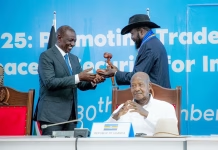According to the latest figures released by the East African Business Council Burundi’s trade with the East African Community member states declined by 4.1% ($162 million) in 2017 from 169 million in 2016, the regional business council said that the decline of the country’s trade with member states is as a result of decline in volume of both imports and exports.
“In 2017 there was no any single cross border investment from Burundi to other countries …so the main challenge the private sector is facing is the issue of nationalism which doesn’t reflect the regional agenda,” said Al Hadji Rashid Kibowa the Director of trade at the EAC secretariat.
Mr. Lubowa said that in order for the private sector to overcome the current challenges and non-tariff barriers that hinders the free movement of goods and services in the region, there is a need for the involvement of the private sector and be present when the national policies are drafted or made.
In 2017 Uganda and Kenya were the main destinations of Burundi’s exports accounting for 41% and 34% of total intra EAC domestic exports respectively, the key commodities included coffee, soap and oil seed.
The country’s domestic exports to member states shrunk by 23% ($9.5 million) in 2017 from $12 million in 2016, according to the East African Trade and Investment report 2019 the decline was attributed to the fall in both volumes and value of soap and oil seed exported to Rwanda and Tanzania.
Despite a decline in the intra-regional trade, Burundi’s international trade increased by 19% ($905 million) in 2017 from $760 million recorded in 2016. According to the East African Business council Burundi’s major trade partner in 2017 were EAC, European Union, China and India.






